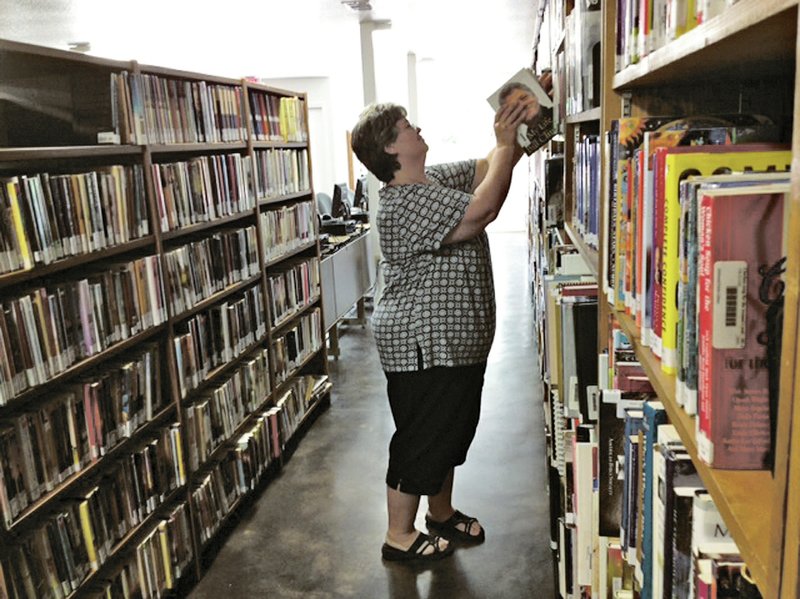LYNN -- In 1991, when the Lawrence County Library System wanted to add two branch locations, Lynn wasn't originally considered.
The remote farming town of 282 is 15 miles down a winding stretch of Arkansas 25 from Powhatan. Its largest employers are a farm-services company and the small Hillcrest School District, which is about 6 miles south.
Library system administrators didn't think a branch would fare well in the town.
But overwhelming support from the town's residents brought a branch library to the southwestern Lawrence County community, and the Driftwood Library -- named for a long-ago community near the Strawberry River -- has thrived since.
Local support is crucial for rural libraries, especially at a time when funding is hard to come by, library officials say. The state Legislature in March sliced $1 million in state aid to Arkansas public libraries.
"There's a hunger out there for libraries, but some smaller communities may not have the money to feed that hunger," said Ruth Hyatt, manager of library services for the Arkansas State Library. "We get calls every day from people wanting to develop their libraries or fighting to keep the survival of them going.
"You have to get creative when revenues begin shrinking," Hyatt said. "Book budgets are humongous. Rural libraries have to rely on book sales, donations and community support."
In Lynn, residents chipped in when their town's library needed to move to a new location because its 107-year-old building was in disrepair. Termites were damaging the structure, which was built in 1908 and also housed a doctor's office, a grocery store, a restaurant and a ceramics shop in the past.
Earlier this month, the library moved into a new facility, next to the former library building, that was provided by the city.
Volunteers helped move books from the old library to the new one over a weekend. It took nine hours to install the shelves and move all the furniture, computers and books, said Kathy Bates, the Driftwood librarian.
"We had lots of help moving it," she said. "We made a line and just started passing things. Believe me, we had plenty of advice on how to do things."
Lynn's library is one of two branches in the Lawrence County library district -- the only district in the state that has its branches only in one county. The district, based in Walnut Ridge, also has a branch library in Imboden.
In addition to state money and federal grants, the district is funded by a 2-mill property tax that brings in about $10,000 annually, district librarian Ashley Burris said.
"If you have the support of your community, you can make a library work," Burris said. "Lynn has had to fight before to keep its school [in nearby Strawberry]. They are used to supporting what they need."
In Prairie County, voters turned down in a 2-mill increase in the November general election that would have funded the DeValls Bluff Public Library. The library closed soon after the defeat, and patrons had to travel 9 miles to the Des Arc Public Library.
Officials are placing a new millage issue on a special election ballot for July 14.
"Your library is only as good as the people who support it," said Des Arc librarian April Highfill. "Without their support, you have a dying library."
Rural libraries are defined as those in towns of 2,500 or less by the Association for Rural and Small Libraries, a Lexington, Ky., organization that supports the development and growth of small-town libraries.
"Communities need their libraries now more than ever," said Judy Calhoun, an association board member and the director of the Southeast Arkansas Regional Library System in Monticello.
"The more the economy continues to decline, the more library usage we see."
Joanna Whisenhunt of the Montgomery County Public Library said state budget cuts of about $11,000 next year will force libraries in the Ouachita Mountains Regional Library system -- of which Whisenhunt's library is a member -- to rely even more on local support.
"Most of our books and movies are donated," she said. "We've learned a long time ago to survive on almost nothing.
"We have book sales twice a year, and people give us money as memorials to buy books."
The William F. Foster Library in England holds summer children's reading programs to entice youths to use the library, said Lindsay Durant, a clerk.
"A majority of the kids in our programs live below the poverty line," Durant said. "For some of these kids, the only summer vacation they have is either playing outside or going to the library.
"If not for the local businesses who donate books, we might not have the program," Durant said. "We have people donate every year. It's awesome how the community helps."
In Lynn, about a week after the Driftwood Library opened, Retta Stuart entered the library looking for a book in a fictional series about an Amish family. Bates found the book for her.
"It's great to have this here," said Stuart, who had returned home to Lynn the night before from a trip to Oklahoma. "I finished my book and needed a new one today.
"When I was a little girl, we didn't have a close library," she said. "We had to drive to Walnut Ridge or wait for the Bookmobile to come through."
Outside, a large, green tractor hauling a bale of hay rumbled down Arkansas 25 and turned near the library.
Another woman stopped in and left a bag of magazines and books.
Others talked about the book donation drive at Hillcrest Elementary School for the library.
About 15 to 30 people visit the library daily, Bates said. She expects more this summer once school is out.
The Driftwood Library is open from noon to 5 p.m. Mondays through Fridays and from 9 a.m. to noon on Saturdays. Bates is also the Lynn postmaster, and she keeps the post office open in the mornings during the week.
Because Lynn is so small, Bates comes in contact with most of its residents at either the library or post office.
"I've had people come in to the library wanting to buy stamps," she said. "I've also had them drop overdue books off at the post office. People are always asking me what I'd recommend to read. I know everybody, and I know what they all like."
Many small libraries rely on volunteer work or part-time librarians, Calhoun said.
"Lots of librarians do double duty," she said. "It's just part of that support. There is a fierce independence in small libraries. Initially, when they first open, there's an influx of donations and collections. Then, the librarians develop criteria of what to accept based on what their [patrons] want.
"Shelf space is prime real estate in smaller libraries," she said. "You've got to weed out books that aren't being checked out so your people keep coming back."
Bates said she hopes to start a reading group at the new library to bring more readers in. She is also getting e-books, electronic versions of printed books that can be read on computers or hand-held devices.
"We still have to keep up with the times," Bates said.
"If we closed this, would we miss it?" she asked. "Absolutely. I'm proud of our library. The community is."
A Section on 05/25/2015


